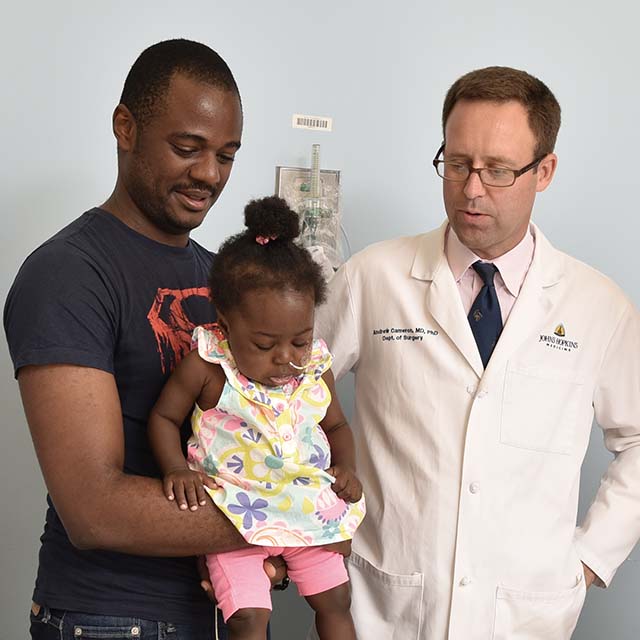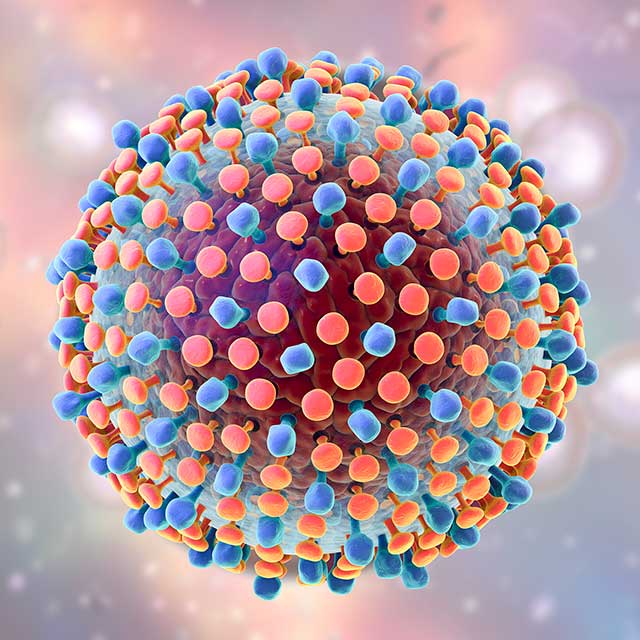Transplant surgeon Andrew Cameron says Johns Hopkins is poised to change the way America looks at treating alcoholic hepatitis.
For decades, transplant centers in the United States have followed a guideline that requires patients to abstain from drinking alcohol for six months to be eligible for a liver transplant. With cadaveric donor livers in high demand, most transplant centers will not consider patients whose liver damage stems from recent alcohol use, a policy that, according to Cameron, amounts to a death sentence.
Now, in papers published in the Journal of Hepatology and the Journal of Intensive Care Medicine, Johns Hopkins researchers outline the case for giving liver transplants to selected patients with alcoholic hepatitis. Not only is their argument backed by data from a six-year pilot study at Johns Hopkins, but they have also received an $8.4 million grant from the National Institutes of Health to expand the study to even more patients with the deadly condition.
“This is an opportunity for us to rewrite the rules using scientific rigor and data that we’re generating. I think that’s a chance to set the record straight on how modern medicine can be done in a truly fair and transparent way,” says Cameron, a professor of surgery and chief of the Johns Hopkins University School of Medicine’s Division of Transplantation.
A Deadly Condition
Alcoholic hepatitis is a dangerous inflammation of the liver. Unlike more common forms of hepatitis, it is acquired by drinking alcohol, rather than by exposure to a virus. Not all heavy drinkers get it, nor does it always stem from especially heavy drinking.
Johns Hopkins is one of the few centers in the United States that will consider liver transplants into patients with alcoholic hepatitis whose sobriety doesn’t reach the six-month threshold. That rule is based on stigma rather than science, Cameron says. He cites the widely held medical opinion that alcoholism is a disease and that people who suffer from it need treatment.
“It’s not a ‘Johns Hopkins thing’ to deprive people of an intervention just because it’s your notion that they don’t deserve it,” he says. “That’s not how we do things here.”
According to Cameron, the dogma began to change in 2011, when the New England Journal of Medicine published a study by French researchers demonstrating excellent results in transplants of a small number of patients with alcoholic hepatitis. Today, he says, it’s fairly common practice in Europe.
Last year, the Johns Hopkins team reported on the outcomes of the first 46 patients who underwent liver transplantation under its pilot program. Patients who received livers between October 2012 and July 2017 were followed for an average of 532 days after transplant. During the follow-up period, the alcohol relapse rate among patients who did not have a wait period was identical to that seen in a group of 34 patients who received transplants under the standard six months of sobriety rule. In both cases, 28% relapsed at one point, but 98% of all patients were sober at the end of the study period.
Cameron says Johns Hopkins’ overall one-year post-liver transplant survival rate is 93%, adding that patients with alcoholic hepatitis generally fare at least as well as other liver transplant patients.
Severe Alcoholic Hepatitis and Early Liver Transplant | FAQ with Dr. Andrew Cameron
Transplant surgeon Andrew Cameron answers frequently asked questions about treatment options for severe alcoholic hepatitis, including the possibility of liver transplant.
“Only a few days of life left”
Transplant centers around the world employ a scoring system to determine the extent of liver disease, no matter the source. The Model for End-stage Liver Disease (MELD) scale ranges from 6 to 40. Cameron says his patients with alcoholic hepatitis average a MELD score of 36.
“That usually means they have only a few days of life left,” he explains. “Without a transplant, they’ll die very soon.”
Patient referrals to Johns Hopkins from other hospitals and transplant centers that abide by the six-month guideline are common, says Cameron. “We get patients from up and down the East Coast, although Maryland, Virginia, Pennsylvania and Washington, D.C., are the most common places. Often, the patients are too sick to travel very long distances.”
While the six-month guideline isn’t a requirement to get a liver transplant at Johns Hopkins, patients need to possess insight into their alcoholism to qualify for transplantation.
“This surgery is for people for whom there is evidence of an ability to turn their life around,” Cameron says. “Before we agree to the transplant, we look at the patient’s family or other support systems and the patient’s commitment to change.”
Cameron and his team will use part of the NIH’s $8.4 million grant to explore solutions to help transplant patients avoid a recurrence of the condition.
“A liver transplant won’t cure alcohol use disorder,” he acknowledges. “We’re exploring behavioral and pharmacologic interventions to give our patients their best shot at a healthy life.”
The grant also supports a tissue bank where researchers from around the country can get access to alcoholic liver tissue.
“Every time we do a transplant, we’re removing about a pound and a half of diseased liver tissue. We’re going to study that tissue in hopes of learning a lot more about the pathology of alcoholic hepatitis,” Cameron says, adding that more than 50 researchers from around the country are already studying samples from the tissue bank.




